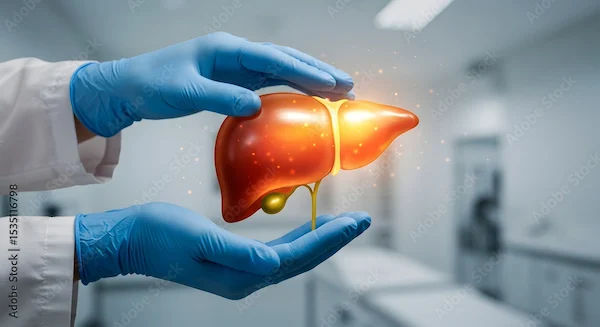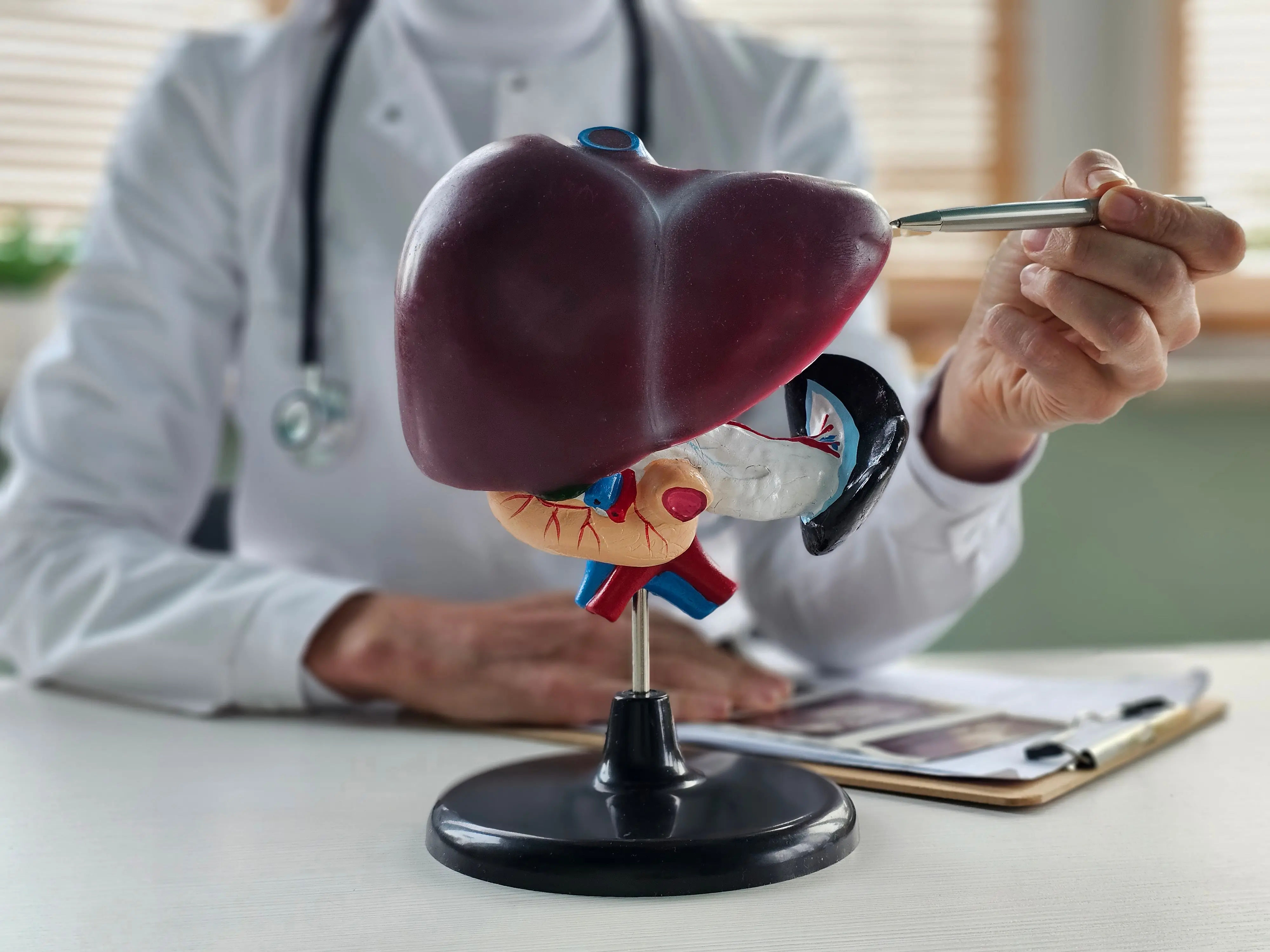How To Reduce SGPT Quickly: Natural and Medical Methods
Liver dysfunction, diabetes, heart diseases, etc., contribute to an increased level of SGPT. Learn about the adverse effects of higher SGPT and ways to manage it.

Written by
Last updated on 13th Jan, 2026
SGPT, or Serum Glutamic-Pyruvic Transaminase, is an enzyme found in one's liver cells. It is also called ALT (alanine aminotransferase). The normal SGPT level ranges from 22 to 45 units per litre for a female and 7 to 56 units per litre for a male. Liver dysfunction or damage can lead to the release of SGPT in one’s bloodstream, increasing the SGPT level beyond the recommended range.
The abnormal increase in the SGPT level can cause severe health complications in an individual. Thus, it is essential to control this condition with proper preventive measures. Keep reading to learn the causes, remedies, and treatments for higher SGPT levels.
Causes of Elevated SGPT Levels
SGPT levels in a person can increase due to the following reasons:
Liver Diseases and Medical Conditions
SGPT levels are mostly affected due to liver-related illnesses. Hepatitis A, B, C, and E and viral hepatitis increase the risks of higher SGPT as they cause inflammation in the liver. Another liver condition that affects the SGPT level is NAFLD (Non-alcoholic fatty liver disease). It is caused due to excessive fat in the liver, which also leads to diabetes and obesity.
SGPT level is also elevated by cirrhosis of the liver. Caused due to the formation of scar tissues in a person's liver, this disease damages the liver permanently. Apart from liver conditions, certain medical conditions like heart attacks, celiac disease, dermatomyositis, diabetes, inflammation in the gallbladder, etc., can also trigger the liver enzymes to increase.
Taking cholesterol-reducing statins, antibiotics, or pain relievers for a long time can also lead to fatty liver, increasing the SGPT levels.
Lifestyle Factors Contributing to High SGPT
Certain lifestyle habits influence one's health adversely. Excessive alcohol consumption can increase SGPT levels, leading to cirrhosis of the liver, which is the last stage of liver damage. Individuals who avoid physical activities can also experience elevated SGPT levels, leading to overweight or obesity. Having more than one sex partner is also an alarming habit that can cause liver diseases and increase the SGPT level.
How to Lower SGPT Levels Through Diet?
Changes in dietary habits can help control a person's SGPT levels effectively. Including and excluding some specific food can help manage the condition.
Foods that are Beneficial for Liver Health
There’s no substitute for a balanced diet in improving liver function and health. Here are some of the foods that one can include in their diet to reduce SGPT levels:
Turmeric for its anti-inflammatory properties
Green leafy vegetables like kale, and spinach for detoxification
Garlic for its allicin compounds
Green tea acts as antioxidants
Fishes rich in omega-3 fatty acids
Polyphenol-content fruits like grapes and berries
Foods rich in healthy fats such as olive oil, nuts, etc.
Coffee
Vitamin D, etc.
Foods to Avoid for Reducing SGPT
Here are some of the foods that should be excluded from one’s diet to normalise SGPT levels:
Foods containing added sugar or processed foods like carbonated drinks, sugary snacks, etc.
Deep-fried, oily, and fatty foods like high-fat dairy products, fatty meats, etc.
Sodium intake should be limited to 2,300 milligrams a day
Breads made of white flour, pasta, rice, etc.
Herbal and Natural Remedies to Lower SGPT Levels
Herbal teas have been found to improve liver health. One can try green tea, chamomile, and other herbal teas to reduce the SGPT levels. Some other natural elements like milk thistles and dandelion roots can also improve an individual's liver condition. The silymarin in milk thistles helps in liver cell regeneration, and dandelion roots detoxify the liver, reducing SGPT levels. Another natural ingredient that increases the antioxidant level is NAC (N-acetylcysteine).
Pharmaceutical Options to Treat SGPT Level
The SGPT level of one’s liver may increase due to several factors like side effects of drugs, alcoholic liver disease, hepatitis, fatty liver, etc. Depending on the cause behind the SGPT elevation, doctors prescribe the following medicines:
Vitamin E Supplements
Vitamin E can lower the SGPT levels when taken at a daily dose. This antioxidant nutrient contains free radicals that can protect the liver cells from damage.
Hydroxychloroquine
This anti-malarial drug is also used to treat lupus and rheumatoid arthritis. If this medicine is taken with Methotrexate (MTX) or aspirin, it can affect the SGPT levels in the human body.
UDCA (Ursodeoxycholic Acid)
The intestinal bacteria produce a secondary bile called UDCA. It is known to improve liver function with hepatoprotective effects, reducing SGPT levels.
Potential Side Effects of SGPT-regulating Drugs
The medicines used to lower the SGPT levels may cause the following side effects:
Allergic Reactions
SGPT-treating drugs can also cause allergic reactions in some people, leading to swelling, skin rashes, breathing issues, and itching.
Drug Interactions
If a person is taking some other drugs, medicines treating high SGPT levels can interact with them and reduce the effectiveness of SGPT treatment.
Gastrointestinal Problems
Some drugs may lower the SGPT levels but cause adverse gastrointestinal problems such as abdominal pain, nausea, diarrhoea, vomiting, etc. However, these side effects are not permanent and can go away with the changes in medicine dosage.
Some other side effects of these drugs are listed below:
Headache
Muscle pain
High or low blood pressure
Dizziness
Fatigue
Stomach upset, etc.
Importance of Lifestyle Modifications in Reducing SGPT Levels
Besides dietary changes, one should also focus on lifestyle improvements to treat SGPT levels.
The Role of Exercise in Liver Health
Moderate physical activities for at least half an hour daily, five times a week, help manage weight and improve liver function. It is also important to keep oneself hydrated to ensure improved liver health. Thus, individuals with liver issues must drink at least 8 to 10 glasses of water daily. Along with these, one should quit smoking and drinking and even passive exposure to smoke for a healthy liver.
Sleep and Stress Management Techniques
A minimum of 7 to 9 hours of sleep is necessary on a regular basis at night. This provides enough rest to the liver and improves its functioning. Another crucial factor that leads to a higher SGPT level is stress, as it elevates cortisol production by affecting the blood flow in the body. Thus, it is essential to adopt stress management techniques like meditation, yoga, etc., to ensure a calm and sound mind.
Monitoring and Follow-up to Reduce SGPT Levels
One should opt for a routine check-up to analyse the SGPT levels and follow up with the healthcare provider for advice. If the doctor notices any improvement in the SGPT levels, he may change the course of medicine and suggest other health practices to keep the SGPT levels under check.
When to Seek Medical Advice?
Noticing symptoms like abdominal pain, fatigue, jaundice, etc., are indicative of an irregular SGPT level. One should seek professional help upon noticing any of these signs. The doctors suggest a routine SGPT or ALT (alanine aminotransferase test) test to keep track of one's SGPT levels. Depending on the test results, doctors will determine the treatment methods.
Conclusion
Reducing SGPT levels involves a comprehensive approach, including dietary changes, lifestyle modifications, herbal remedies, and, in some cases, pharmaceutical interventions. Regular monitoring and consultation with a healthcare provider are crucial for maintaining liver health and preventing future SGPT elevation.
Consult Top Hepatologist
Consult Top Hepatologist

Dr. E Prabhakar Sastry
General Physician/ Internal Medicine Specialist
40 Years • MD(Internal Medicine)
Manikonda Jagir
Apollo Clinic, Manikonda, Manikonda Jagir
(150+ Patients)

Dr. Akshatha Manjunath
General Surgeon
8 Years • MBBS, MS
Bangalore
Apollo Clinic Bellandur, Bangalore

Dr. Pukhraj Singh Jeji
Gastroenterology/gi Medicine Specialist
13 Years • MBBS, MD ( Internal Medicine ), DM ( Gastroenterology ), Consultant - Gastroenterology
Bhubaneswar
Apollo Hospitals Old Sainik School Road, Bhubaneswar

Dr. Sushith C
General Physician
2 Years • MBBS
Bengaluru
PRESTIGE SHANTHINIKETAN - SOCIETY CLINIC, Bengaluru

Dr. Aswin S. Krishna
Hepatologist
10 Years • MBBS, MD (Internal Medicine,MMC), DM (Hepatology, MMC), PDF(Fellowship in Liver Transplanatation)
Chennai
Apollo Hospitals Greams Road, Chennai
(125+ Patients)



